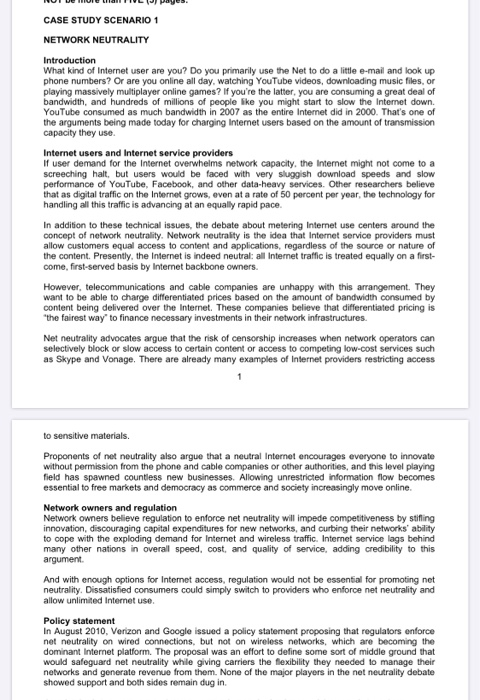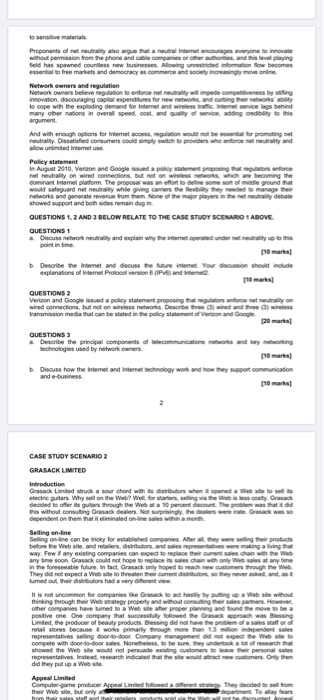CASE STUDY SCENARIO 1 NETWORK NEUTRALITY Introduction What kind of Internet user are you? Do you primarily use the Net to do a little e-mail and look up phone numbers? Or are you online all day, watching YouTube videos, downloading music files, or playing massively multiplayer online games? If you're the latter, you are consuming a great deal of bandwidth, and hundreds of millions of people like you might start to slow the Internet down. YouTube consumed as much bandwidth in 2007 as the entire Internet did in 2000. That's one of the arguments being made today for charging Internet users based on the amount of transmission capacity they use. Internet users and Internet service providers If user demand for the Internet overwhelms network capacity, the Internet might not come to a screeching halt, but users would be faced with very sluggish download speeds and slow performance of YouTube, Facebook, and other data-heavy services. Other researchers believe that as digital traffic on the Internet grows, even at a rate of 50 percent per year, the technology for handling all this traffic is advancing at an equally rapid pace. In addition to these technical issues, the debate about metering Internet use centers around the concept of network neutrality. Network neutrality is the idea that Internet service providers must allow customers equal access to content and applications, regardless of the source or nature of the content. Presently, the Internet is indeed neutral: all Internet traffic is treated equally on a first- come, first-served basis by Internet backbone owners. However, telecommunications and cable companies are unhappy with this arrangement. They want to be able to charge differentiated prices based on the amount of bandwidth consumed by content being delivered over the Internet. These companies believe that differentiated pricing is "the fairest way to finance necessary investments in their network infrastructures. Net neutrality advocates argue that the risk of censorship increases when network operators can selectively block or slow access to certain content or access to competing low-cost services such as Skype and Vonage. There are already many examples of Internet providers restricting access to sensitive materials. Proponents of net neutrality also argue that a neutral Internet encourages everyone to innovate without permission from the phone and cable companies or other authorities, and this level playing field has spawned countless new businesses. Allowing unrestricted information flow becomes essential to free markets and democracy as commerce and society increasingly move online. Network owners and regulation Network owners believe regulation to enforce net neutrality will impede competitiveness by stifling innovation, discouraging capital expenditures for new networks, and curbing their networks ability to cope with the exploding demand for Internet and wireless traffic. Internet service lags behind many other nations in overall speed, cost, and quality of service, adding credibility to this argument. And with enough options for Internet access, regulation would not be essential for promoting net neutrality. Dissatisfied consumers could simply switch to providers who enforce net neutrality and allow unlimited Internet use. Policy statement In August 2010, Verizon and Google issued a policy statement proposing that regulators enforce net neutrality on wired connections, but not on wireless networks, which are becoming the dominant Internet platform. The proposal was an effort to define some sort of middle ground that would safeguard net neutrality while giving carriers the flexibility they needed to manage their networks and generate revenue from them. None of the major players in the net neutrality debate showed support and both sides remain dug in. to materials Proponents of net neutrality to argue that a neutral Internet encourage everyone to innovate without permission from the phone and cable companies or other authors, and this level playing field has spawned countless new business Allowing into tow becomes sent to free markets and democracy commerce and see online Network owners and regulation Network owners believe regulation to entorpe net neutrality will impede competitiveness by stilling innovation discouraging capital expenditures for new networks and Outing their news ability to cope with the exploding demand for Internet and wireless ac internet service lags behind many other nations in overall speed cost and quality of service ding credibility to this argument And with enough options for Internet common would not be for promoting net neutrality. Dissed consumers could simply switch to provides forceset neutrality and allow unlimited interest Policy statement In August 2010, Verizon and Google issued a policy statement proposing the regulators enforce net neutrality on wired connections, but not on wireless networks which are becoming the dominant Internet platform. The proposal was an effort to define some sort of middle ground that would safeguard net neutrality while giving camers the fill they needed to manage their networks and generate revenue from them. None of the major players in the net neutrality debate showed support and both sidesroman dug in QUESTIONS 1. 2 AND 3 BELOW RELATE TO THE CASE STUDY SCENARIO 1 ABOVE QUESTIONS Discuts network neutrality and explain why the internet pested under et elity to the point in time [10 mars Describe the Internet and discuss the internet your discussion should indude explanations of Internet Protocol version 6 (IP) and interne 10 mars! QUESTIONS 2 Verizon and Google issued a policy statement proposing the guitators enforcemet neutrality on Wired connections, but not on wireless networks Describe the red and trees transmission media that can be stated in the policy statement fernand Google 20 marka QUESTIONS Describe the principal components of telecommunication works and by working technologies used by network owners [10 marts Discuss how the Internet and Internet technology work and how they support communication and e-business [10 marks CASE STUDY SCENARIO 2 GRASACK LIMITED Introduction Grasack Limited struck a sour chord with its distributors when teneda Website to sell electric guitars. Why sell on the Web? Well or starter selling the West Granack decided to offer is guitars through the web a 10 percent discount. The problem hattad this without consulting Gracters. Not surprising the dealers dependent on them that it eliminated online sales within a month Selling on-line Selling online can be tricky for established companies. After they were ling their products before the website and retailers, distributors, and sales representes making a living that way. Few any existing companies can expect to replace their current sales chain with the Web anytime soon Grasack could not hope to replace is sales chain with only Web sales at any time in the foreseeable future. In fact, Grasack only hoped to reach new customers through the Web They did not expect a Webbe to threaten their comment distributions they were and turned out their distributors had a very different It is not uncommon for companies like sack to act hastly by putting up a Web site without Thinking though their web strategy property and without consulting the sales gamers. However, other companies have tumed to a Web site after proper planning and found the move to be a positive one One company that successfully followed the arch was Blessing Limited, the producer of beauty products. Blessing did not have the problem of a sales staff or of retail stores because works primarily through more than 13 million independent sales representatives seling door to door Company management od not expect the Website to compete with door to door sales. Nonetheless, to be sure they undertook a lot of research that showed the Web she would not persuade sting customers to have their personal sales representatives. Instead, search indicated that these would rathewonersOnly then did they put up a Website Appeal Limited Computiname producer Aceal Limited followed a different. They decided to from their website, but only Went To Wayfar from the CASE STUDY SCENARIO 1 NETWORK NEUTRALITY Introduction What kind of Internet user are you? Do you primarily use the Net to do a little e-mail and look up phone numbers? Or are you online all day, watching YouTube videos, downloading music files, or playing massively multiplayer online games? If you're the latter, you are consuming a great deal of bandwidth, and hundreds of millions of people like you might start to slow the Internet down. YouTube consumed as much bandwidth in 2007 as the entire Internet did in 2000. That's one of the arguments being made today for charging Internet users based on the amount of transmission capacity they use. Internet users and Internet service providers If user demand for the Internet overwhelms network capacity, the Internet might not come to a screeching halt, but users would be faced with very sluggish download speeds and slow performance of YouTube, Facebook, and other data-heavy services. Other researchers believe that as digital traffic on the Internet grows, even at a rate of 50 percent per year, the technology for handling all this traffic is advancing at an equally rapid pace. In addition to these technical issues, the debate about metering Internet use centers around the concept of network neutrality. Network neutrality is the idea that Internet service providers must allow customers equal access to content and applications, regardless of the source or nature of the content. Presently, the Internet is indeed neutral: all Internet traffic is treated equally on a first- come, first-served basis by Internet backbone owners. However, telecommunications and cable companies are unhappy with this arrangement. They want to be able to charge differentiated prices based on the amount of bandwidth consumed by content being delivered over the Internet. These companies believe that differentiated pricing is "the fairest way to finance necessary investments in their network infrastructures. Net neutrality advocates argue that the risk of censorship increases when network operators can selectively block or slow access to certain content or access to competing low-cost services such as Skype and Vonage. There are already many examples of Internet providers restricting access to sensitive materials. Proponents of net neutrality also argue that a neutral Internet encourages everyone to innovate without permission from the phone and cable companies or other authorities, and this level playing field has spawned countless new businesses. Allowing unrestricted information flow becomes essential to free markets and democracy as commerce and society increasingly move online. Network owners and regulation Network owners believe regulation to enforce net neutrality will impede competitiveness by stifling innovation, discouraging capital expenditures for new networks, and curbing their networks ability to cope with the exploding demand for Internet and wireless traffic. Internet service lags behind many other nations in overall speed, cost, and quality of service, adding credibility to this argument. And with enough options for Internet access, regulation would not be essential for promoting net neutrality. Dissatisfied consumers could simply switch to providers who enforce net neutrality and allow unlimited Internet use. Policy statement In August 2010, Verizon and Google issued a policy statement proposing that regulators enforce net neutrality on wired connections, but not on wireless networks, which are becoming the dominant Internet platform. The proposal was an effort to define some sort of middle ground that would safeguard net neutrality while giving carriers the flexibility they needed to manage their networks and generate revenue from them. None of the major players in the net neutrality debate showed support and both sides remain dug in. to materials Proponents of net neutrality to argue that a neutral Internet encourage everyone to innovate without permission from the phone and cable companies or other authors, and this level playing field has spawned countless new business Allowing into tow becomes sent to free markets and democracy commerce and see online Network owners and regulation Network owners believe regulation to entorpe net neutrality will impede competitiveness by stilling innovation discouraging capital expenditures for new networks and Outing their news ability to cope with the exploding demand for Internet and wireless ac internet service lags behind many other nations in overall speed cost and quality of service ding credibility to this argument And with enough options for Internet common would not be for promoting net neutrality. Dissed consumers could simply switch to provides forceset neutrality and allow unlimited interest Policy statement In August 2010, Verizon and Google issued a policy statement proposing the regulators enforce net neutrality on wired connections, but not on wireless networks which are becoming the dominant Internet platform. The proposal was an effort to define some sort of middle ground that would safeguard net neutrality while giving camers the fill they needed to manage their networks and generate revenue from them. None of the major players in the net neutrality debate showed support and both sidesroman dug in QUESTIONS 1. 2 AND 3 BELOW RELATE TO THE CASE STUDY SCENARIO 1 ABOVE QUESTIONS Discuts network neutrality and explain why the internet pested under et elity to the point in time [10 mars Describe the Internet and discuss the internet your discussion should indude explanations of Internet Protocol version 6 (IP) and interne 10 mars! QUESTIONS 2 Verizon and Google issued a policy statement proposing the guitators enforcemet neutrality on Wired connections, but not on wireless networks Describe the red and trees transmission media that can be stated in the policy statement fernand Google 20 marka QUESTIONS Describe the principal components of telecommunication works and by working technologies used by network owners [10 marts Discuss how the Internet and Internet technology work and how they support communication and e-business [10 marks CASE STUDY SCENARIO 2 GRASACK LIMITED Introduction Grasack Limited struck a sour chord with its distributors when teneda Website to sell electric guitars. Why sell on the Web? Well or starter selling the West Granack decided to offer is guitars through the web a 10 percent discount. The problem hattad this without consulting Gracters. Not surprising the dealers dependent on them that it eliminated online sales within a month Selling on-line Selling online can be tricky for established companies. After they were ling their products before the website and retailers, distributors, and sales representes making a living that way. Few any existing companies can expect to replace their current sales chain with the Web anytime soon Grasack could not hope to replace is sales chain with only Web sales at any time in the foreseeable future. In fact, Grasack only hoped to reach new customers through the Web They did not expect a Webbe to threaten their comment distributions they were and turned out their distributors had a very different It is not uncommon for companies like sack to act hastly by putting up a Web site without Thinking though their web strategy property and without consulting the sales gamers. However, other companies have tumed to a Web site after proper planning and found the move to be a positive one One company that successfully followed the arch was Blessing Limited, the producer of beauty products. Blessing did not have the problem of a sales staff or of retail stores because works primarily through more than 13 million independent sales representatives seling door to door Company management od not expect the Website to compete with door to door sales. Nonetheless, to be sure they undertook a lot of research that showed the Web she would not persuade sting customers to have their personal sales representatives. Instead, search indicated that these would rathewonersOnly then did they put up a Website Appeal Limited Computiname producer Aceal Limited followed a different. They decided to from their website, but only Went To Wayfar from the








